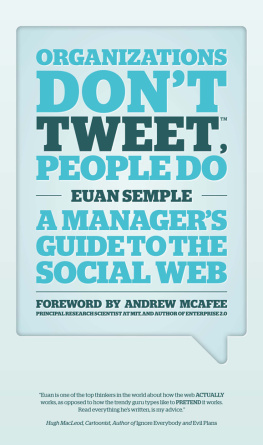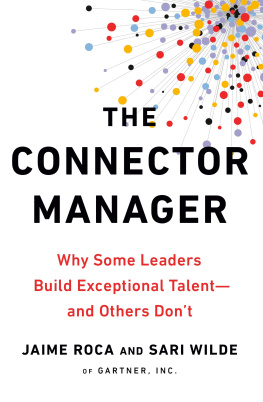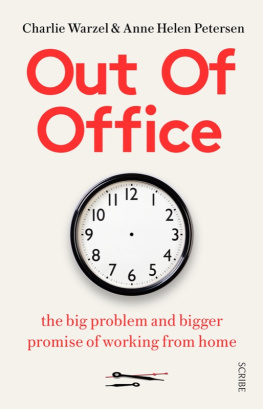Foreword
It is businesss dirty little secret. Put simply, the work environment for todays employees, no matter the industry or location, has deteriorated badly in recent years. At the same time Americas workers are being placed under tremendous pressure to produce more in less time and with fewer resources, the traditional benefits of full-time employment are being eroded.
To a great extent, the problem is an outgrowth of managements abdication of their longstanding responsibility to provide leadership. By the mid-1990s, we started to hear the phrase that were all self-employed, signifying that we no longer were all in this together, but rather it was every man and woman for themselves. This concept was strongly embraced by corporate leadership... much more than it was by their employees. The result was a significant shattering of the bond between management and employee.
Just as the were all self-employed phase began to lose steam, industry was confronted with the economic downturn at the turn of the century. In response, managers put even more pressure on their employees to produce morefaster and at less cost. Already-strained relationships between management and employees intensified.
In a perfect world, or in a perfect economy, dissatisfied employees would find employment elsewhere. Competition for the best workers would improve conditions for everyone. In fact, however, in a negative environment, employees often lose their confidence. They dont feel comfortable leaving their nest no matter how bad the situation. As a result, their performance continues to spiral downward, becoming a financial drag to their place of employment.
Is there any hope then? Most definitely there is. In the first place, despite the overall rather bleak environment for most workers, there are some companies that have combined impressive financial results with a policy of fully engaging their employees. These companies understand that most employees want to be successful and want to play a key role in the growth of their place of employment. In return for this strong commitment, they ask to share in the rewards of their companys financial success, and to be understood. They want management to recognize and respect their concerns, and not to consider their needs as a lack of dedication to their work.
Managers within these stellar companies also understand that they have a lot at stake in their relationship with their employees. Most insightful corporate leaders recognize that one thing that separates a successful organization from one that is not is its ability to attract, develop, motivate, organize, and retain top-notch employees. Obviously these conditions do not exist in an environment in which employees hate their managers.
Bruce Katcher has put together a management tool kit that quite simply could transform a negative situation within the workplace to one of great promise. Employees should also take heed. There are a number of practical suggestions in the following pages that can open the door to constructive improvements in the management-employee relationship, leading to improved business results.
Bob Gatti
President, Gatti & Associates
Specializing in the Search and Placement of Human Resource Professionals
Acknowledgments
Iwould first like to thank my clients for partnering with me to help make their organizations more productive and satisfying places to work. Together we strive to find the appropriate balance between business realities and treating employees humanely.
Thank you to my wife Trinka and my children Ben and Melanie, who have always been tremendously supportive of my work.
Thank you to my sister, Andrea Brudnicki, whose trying work history has provided me with an endless supply of examples of the mistakes made by management.
Thank you to my colleagues at the Society of Professional Consultants, who have given me strength, friendship, and intellectual support.
Finally, thank you to my brother-in-law and good friend, Adam Snyder, for helping me put my ideas into a coherent and readable form.
Chapter . Introduction
Employees hate management. Hate is a strong word, but in this case its appropriate. Employees hate management because they feel theyre treated with disrespect. They dont trust what management tells them. They feel underpaid and that their income is being squeezed because they are forced to shoulder more and more of the cost of their retirement and health benefits. They also believe their jobs have a negative impact on their quality of life. Most feel powerless to do anything about these concerns, which only increases their frustration. Theyre fearful of losing their jobs and believe that even if they were to find new employment, they would only encounter the same problems.
How do I know all this? I know it because since 1993 my company has been studying how employees view their work and what organizations can do to improve the workplace. Clients use our services when they want to gain an objective, quantitative understanding of what their employees are thinking. Employees are often leery of telling management how they really feel. At Discovery Surveys, we serve as an objective conduit of these thoughts and feelings. During a typical employee survey program, I meet with senior management to learn about their business and gain an understanding of what they really need to know from their employees. I also have the opportunity to meet face-to-face with employees to learn whats really on their minds and what they want management to know. These different perspectives help shape my understanding of the climate of the organization.








